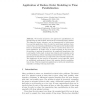Free Online Productivity Tools
i2Speak
i2Symbol
i2OCR
iTex2Img
iWeb2Print
iWeb2Shot
i2Type
iPdf2Split
iPdf2Merge
i2Bopomofo
i2Arabic
i2Style
i2Image
i2PDF
iLatex2Rtf
Sci2ools
104
Voted
HIPC
2005
Springer
2005
Springer
Application of Reduce Order Modeling to Time Parallelization
We recently proposed a new approach to parallelization, by decomposing the time domain, instead of the conventional space domain. This improves latency tolerance, and we demonstrated its effectiveness in a practical application, where it scaled to much larger numbers of processors than conventional parallelization. This approach is fundamentally based on dynamically predicting the state of a system from data of related simulations. In earlier work, we used knowledge of the science of the problem to perform the prediction. In complicated simulations, this is not feasible. In this work, we show how reduced order modeling can be used for prediction, without requiring much knowledge of the science. We demonstrate its effectiveness in an important nano-materials application. The significance of this work lies in proposing a novel approach, based on established mathematical theory, that permits effective parallelization of time. This has important applications in multi-scale simulations,...
Related Content
| Added | 27 Jun 2010 |
| Updated | 27 Jun 2010 |
| Type | Conference |
| Year | 2005 |
| Where | HIPC |
| Authors | Ashok Srinivasan, Yanan Yu, Namas Chandra |
Comments (0)

